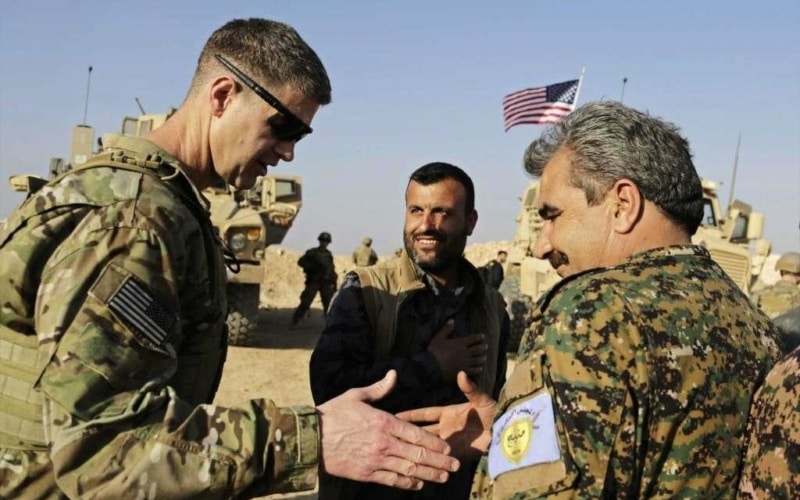US Lt. Gen. Paul Funk greets Kurdish commanders of Syrian Democratic Forces in Manbij, Syria, February 2018
In the final days of the Trump Administration, the US Government is treading carefully between Turkey and Syrian Kurdish authorities over the future of northeast Syria.
With the support of the US military, the Kurdish-led Syrian Democratic Forces pushed out the Islamic State between 2017 and March 2019, and a Kurdish autonomous administration established its authority over much of the region including the cantons of Cezire and Kobani.
But Turkey’s Erdoğan Government sees the Syrian Democratic Union Party (PYD) and its YPG militia — the leading element in the Syrian Democratic Forces — as part of the Turkish Kurdish insurgency PKK, which has fought Ankara’s security forces for more than 35 years.
In October 2019, to limit the Kurdish control, Turkish forces crossed the border, seeking a corridor 440 km (273 miles) long and 30 km (19 miles) deep.
On Wednesday, the new US envoy for Syria, Joel Rayburn, visited Ankara and met Turkish officials, including President Recep Tayyip Erdoğan’s chief foreign policy adviser İbrahim Kalın. No details of the session were released, but Rayburn spoke with Turkey’s Hürriyet Daily News to play up the notion of US-Turkish cooperation.
For those of us inside the process, it’s always felt to us like we had close coordination and cooperation with our Turkish counterparts. I think we just need to build on that. There are so many areas we have identical interests. I think we can build on those.
The envoy did not refer directly to the issue of the Syrian Kurdish area, instead brushing over it:
We had our disagreements, we had our ups and downs but broadly speaking, even in the worst times, it’s felt to us inside the U.S. system that we had close cooperation with our Turkish counterparts. Because at the end of the days, we are allies and we share the common vision for what the rest of the world needs out of Syria in order for our interest to be secured.
He emphasized a joint effort to end the Islamic State “phenomenon in Syria”, to deny a safe haven to “Al Qa’eda”, and to counter the presence of Iran and the Lebanese organization Hezbollah.
“Terror Corridor” v. “US Sanctions on Turkey”
Pressed on the US position in northeast Syria, Rayburn tried to maintain focus on the Islamic State, “The cooperation the U.S. has with the SDF [Syrian Democratic Forces] is pursuing an enduring defeat of Daesh in Syria.”
But he finally had to engage with the Erdoğan Government’s construction of the PYD and YPG as “terrorist”:
The US has no interest and no motivation about establishing a so-called terror corridor in northeastern Syria. The U.S wants to see the Turkish-Syria border stable and secure. The U.S. wants to do everything we can to try to bring some stability to assist the local communities in northeastern Syria and to bring stability to the people who have suffered so much.
So, we certainly have no intention of seeing new threats to Turkey’s security emerge from Syria, whether it is from northeastern Syria or anywhere else.
The envoy’s presentation was far different in an interview with the Kurdish outlet Rojava Information Center, which headlines, “US ‘Ready to Use Sanctions’ to Prevent Turkish Attack on NES [Northeast Syria]”.
Rayburn’s statement did not go as far as to mention Turkey. Instead, he said:
The October 2019 ceasefire agreement was a very important one in halting the conflict in the north-east Syrian zone, and it’s important for that ceasefire agreement to be maintained….
For us, we remain ready to use our leverage, if we have to, things like sanctions, to help to preserve that ceasefire agreement. There are some actors that would like to destabilize the ceasefire arrangement in north-eastern Syria. Clearly, ISIS has an interest in that. There are some other groups, too, that carry out attacks.
Avoiding Northeast Syria’s Long-Term Issue
Twice after conversations with Turkey’s President Erdoğan, in December 2018 and October 2019, Donald Trump suddenly announced a full withdrawal of US personnel from Syria. Ankara used the second occasion to launch its cross-border operation for a corridor, with American troops falling back.
But the Pentagon pushed back on Trump’s declaration, maintaining about 1,000 personnel in Syria. Half of them are working alongside the SDF.
Former envoy James Jeffrey acknowledged last month that the troop numbers were hidden from Trump to prevent an American separation from the Kurdish-led forces.
Current envoy Rayburn skated carefully around the issue of a long-term Kurdish autonomy in northeast Syria, telling the Rojava Information Center:
As far as the political situation in the north-east, the political fate of northeastern Syria needs to be resolved in the broader political process. The people of the northeast should have a voice in that political process, and should be part of the conversation among all Syrians in the Geneva political process.
In the US we don’t make a political distinction about a separate political future [for Syria’s regions]….We have a policy that Syria’s territorial integrity and unity needs to be preserved.

